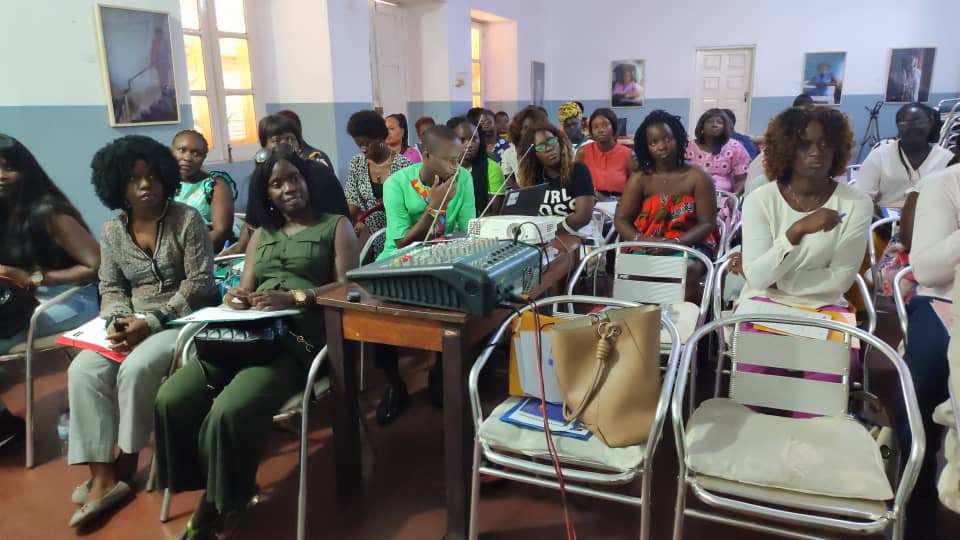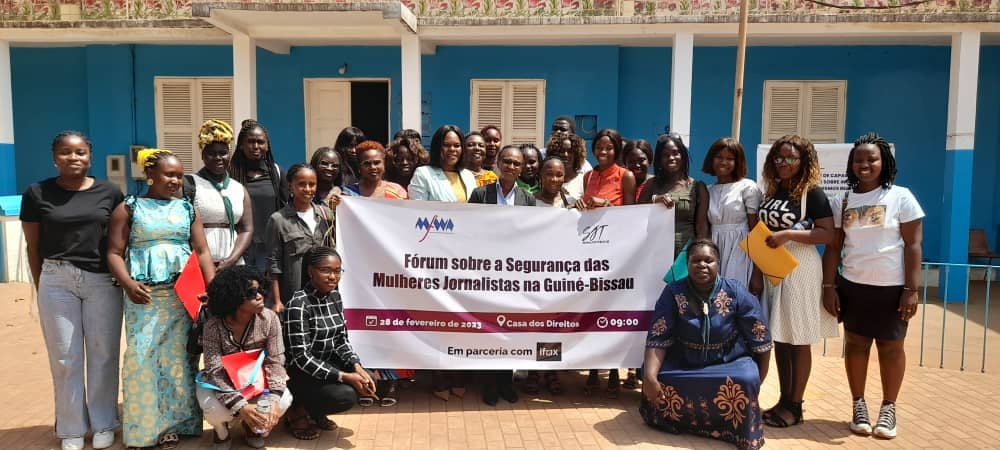The Media Foundation for West Africa (MFWA) has observed a growing trend of physical attacks, arrests, threats, and harassment (online and offline) of female journalists in West Africa.
While some of these attacks are often reported, there are other lesser but more traumatic issues that these journalists silently endure in the course of their work, including sexual harassment and discriminatory practices in newsrooms.
To this end, the MFWA undertook a study in five West African countries, namely Burkina Faso, Guinea, Niger, Nigeria and Guinea Bissau. The findings of the study in each of the countries were compiled in five reports on the safety of female journalists.
On February 28, 2023, the MFWA and its partner organisation in Guinée-Bissau, the Sindicato de Jornalistas e Técnicos da Comunicação Social (SINJOTECS) held a public forum to discuss and disseminate the results of the report on the “Safety of female journalists in Guinea-Bissau”. The event brought together several female journalists, different media defence organisations representatives as well as other key stakeholders and partner organizations.
During the forum, participants discussed attitudes, practices and procedures that undermine the safety and well-being of female media professionals, as well as other factors that limit the full enjoyment of their rights online and offline.
Welcoming the participants, the President of SINJOTECS, Indira Correia Baldé, said that the issue of the “safety of female journalists” at work is of extreme importance and should always be of concern to female journalists themselves because it is considered one of the indispensable conditions for the exercise of their profession.
Mrs. Correia Baldé pointed out that the state of the safety of female journalists is far below expectations because the most important positions in the different media outlets are held by male professionals. In her view, this situation occurs because women accommodate themselves to the scenarios imposed by men in the newsroom. She further expressed dismay at the conformist attitudes of female journalists in newsrooms, and asked the question “why should female journalists have to sexually indulge their boss in exchange for career advancement”?
Statements were also made about the fact that women’s representation in decision-making processes is very low.
Researcher Catarina Gomes Jao said the relationship between men and women in the public and private sphere is the result of man’s will to retain more power, prestige and social recognition to the detriment of women who are generally placed in less important positions, subordination, subject to marginalisation and social devaluation.
Naina Lopes Tamba, a journalist with Televisão da Guiné-Bissau (TGB), said the issue of sexual harassment is quite prevalent in many newsrooms with male colleagues constantly harassing new female employees. She added that although complaints are made to the management of media outlets, they are not accorded any importance and no action is taken against the perpetrators. Even worse, some of the perpetrators are the bosses themselves.
Julinha Sana Sambu, a sports journalist with Guinea-Bissau Television (TGB), said that in most public institutions in Guinea-Bissau, there is always a show of power by men who treat women as “imported products to share them among themselves”. Consequently, they do not treat their female colleagues as professionals.
Most of the participants in the forum indicated that filing any complaint against perpetrators of violations against female journalists would not amount to anything. For them, there is no trust in the justice system. They pointed to social media as the easiest way to discourage the practice of harassment.
Participants also discussed the gap between laws guaranteeing the protection of female journalists and their effective implementation because female media professionals continue to be victims of harassment and other forms of abuse.
Fátima Tchuma Camara, a journalist at the media Radio Difusão Nacional in Guinea-Bissau, declared that the biggest problem for female media practitioners is not the issue of sexual harassment, but moral harassment. “We have colleagues today who are suffering from pressure at their workplaces, in the public sphere and on social media,” she said.
Silvina Tavares, the leader of one of the participating civil society organisations (Women’s Political Platform), called on female journalists to always fight for their empowerment through professionalism and compliance with the ethics and code of conduct of journalism. She added that training is the true path and should be the essential reason for career advancement for any individual.
In the same vein, Magda Francisca Correia, representative of the Network of Women Mediators (Rede das Mulheres Mediadoras – REMUME) urged women journalists to work for their empowerment without expecting favours from anybody. She also drew the attention of female journalists to the need to adapt their attire to suit specific assignments and occasions.
Participants of the Forum on the Safety of Female Journalists in Guinea-Bissau
Domingos Meta Camará, Acting President of the National Media Council (Conselho Nacional da Comunicação Social – CNCS), encouraged female journalists to demonstrate professionalism and responsibility while covering the upcoming presidential elections.

In her closing remarks, the president of SINJOTECS advised female journalists not to take into account any kind of provocation in the work environment and to do everything to maintain neutrality and objectivity in the treatment of information as elections approach.
Among the recommendations was the need for greater solidarity among female journalists, and the creation of mechanisms to facilitate denunciations and follow-up on cases of violations against women’s rights, freedom and guarantees in the media.
Awareness-raising campaigns in newsrooms on the societal role of female media professionals were also recommended. This should be extended to other institutions such as media trade unions, government and other public and private entities.
According to the participants, it is necessary to train women on gender issues to have an understanding of how to diagnose, monitor and combat social behaviours related to sexual harassment in the workplace.
Another recommendation is to develop public policies aimed at reducing all forms of harassment and violence in communication institutions and to create a mechanism for the effective implementation of these policies.
The Forum was supported by IFEX, a global network of independent non-governmental organisations working at the national and international levels to defend and promote freedom of expression and human rights.





